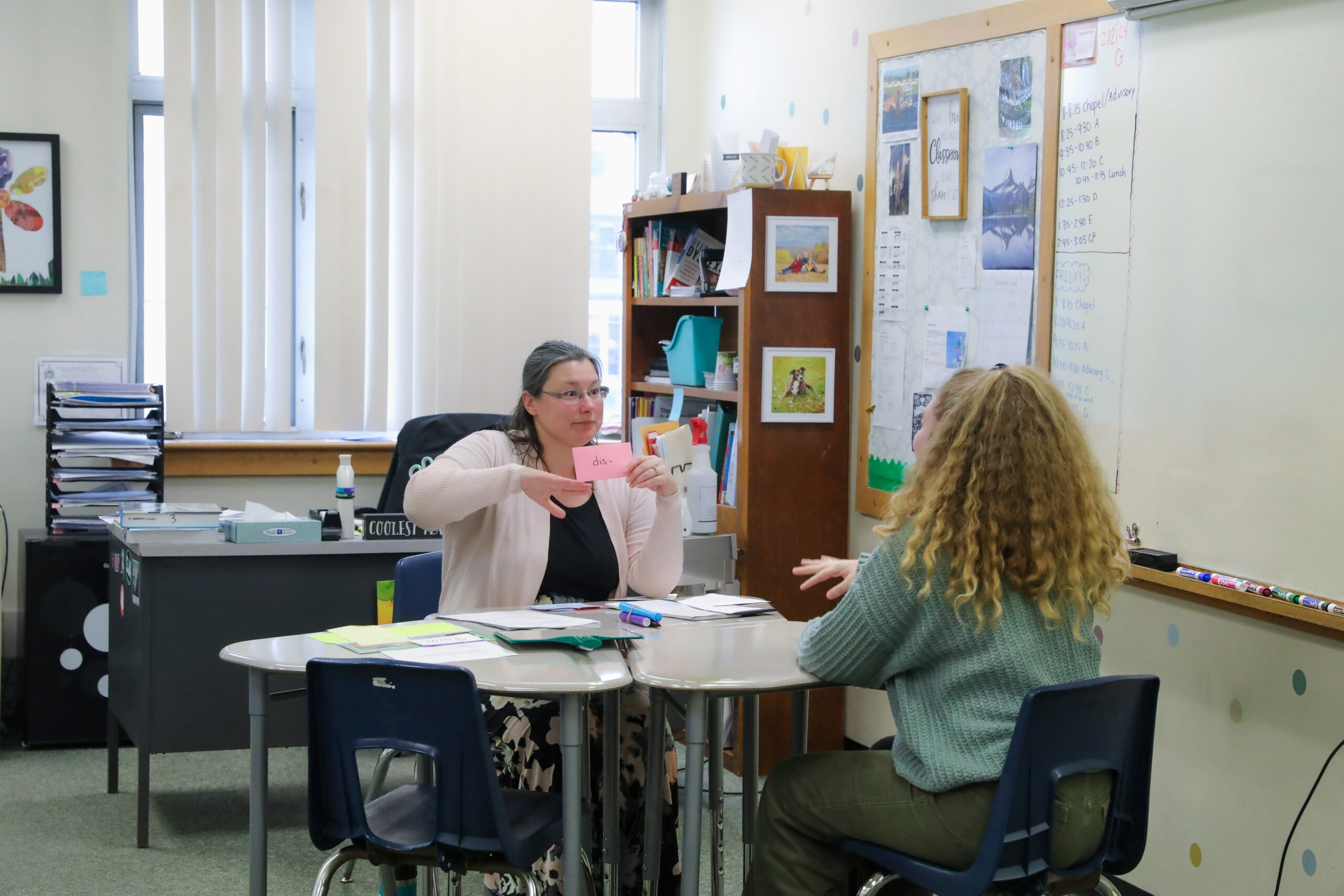Reading, Writing, and Math

Over the last few years, St. Johnsbury Academy has been developing and increasing the capacity of its Student Services Program (formerly Special Services). This newly enhanced program has attracted the interest of the Vermont House and Senate Education Committees, the Vermont Agency of Education, and the Governor’s office.
During the fall of 2020, initial student testing showed that 76% of the approximately 200 students in the school’s Student Services program were struggling with basic literacy and challenges such as dyslexia. To address this increase in students with both reading challenges and an identified learning disability, Student Services would eventually change their approach to teaching literacy. During the pandemic, planning, thought, and departmental restructuring set the stage for the changes that would follow.
Beginning in 2021 with summer training sessions, the Academy put a plan in motion to train all Special Services staff in the Orton-Gillingham method and offered three Orton Gillingham trainings that were open to public school teachers throughout the region. The Academy also hired a reading and writing specialist to support students and help to train teachers.
Named for Samuel T. Orton and Anna Gillingham, who founded the approach in the 1920s, The Orton-Gillingham approach is “a direct, explicit, multisensory, structured, sequential, diagnostic, and prescriptive way to teach literacy when reading, writing, and spelling that does not come easily to individuals, such as those with dyslexia.” (OrtonAcademy.org)
Today, all nine Academy Student Services staff members are trained in the Orton-Gillingham Approach, which required their participation in a 60-hour graduate level training. Three teachers completed a year-long supervised practicum in addition to the 60-hour training, in order to become level-one Orton-Gillingham instructors. Implementing this rigorous literacy approach has had a significant impact on students, particularly combined with the one-on-one and small classes the Academy makes available to students for whom it is particularly beneficial. Director of Student Services Dr. Mathew Forest said, “We need to recognize that so many students with a learning challenge are exceptionally bright; we need to adjust our teaching to meet their needs.”
The large number of students who have been able to overcome reading challenges has inspired another important change. Previously, if students were part of the Academy’s Individualized Services (IS) program, they spent the academic portion of their day in small classes within the Student Services department. Now, many students are able to perform at a level that allows them to move into basic, standard, or even accelerated-level general education classes and succeed in them, while also taking IS classes if they need them. To support this kind of student advancement, a number of classroom teachers have also taken the Orton-Gillingham training so they can apply what they’ve learned in their classrooms.
Augmenting the Orton-Gillingham-based program, St. Johnsbury Academy has added an after-school Reading and Writing Lab, and a math lab, open to all students at any level. These labs are housed within the Student Services Department and offer access to a certified reading and writing specialist and appropriately trained reading, writing, and math teachers. These after-school labs are open to all students.
Sometimes families and students aren’t aware of a learning disability, so another piece of the Academy’s approach has been to offer educational testing to all current students at no charge. Parents can ask the school directly to test their child, or in some cases, teachers will alert the Student Services department staff when they see an issue, and the department will work with parents to decide whether a student would benefit from being evaluated. Often, accommodations or other learning supports can be put in place immediately after the testing and report process is complete, so the student can begin right away to succeed. In the two years the Academy has been offering these services, the school has identified 57 students who had a specific learning challenge not previously identified by their sending districts.
Headmaster Dr. Sharon Howell has been a strong proponent of these changes, “I am grateful to Dr. Mat Forest for his vision and deep understanding of these models and the teachers needed to support their successful use with students. Not only has he built a talented and well-trained department that serves students identified with learning challenges, he has helped to create and foster a culture of support for all students and teachers across the Academy. The goal is always to help our students to thrive academically, socially, and emotionally; and we know that unidentified or unaddressed learning disabilities can contribute to anxiety and feelings of isolation that keep many students from truly engaging with school. This program is a vehicle not only for us to teach students to read, write, and calculate, but also to believe in themselves and their abilities and find joy in learning. We are so proud of the difference our teachers and experts are making in students’ lives.”
By keeping careful records and diligently tracking progress within the student cohort served by the Student Services department, the Academy has seen evidence of robust improvement. AimsWeb testing is given every 2-3 weeks, and AimsWeb benchmark testing is given three times per year—fall, winter, and spring. The illustrations provided show the results of recent testing. In the graphs shown, the solid line represents St. Johnsbury Academy Student Services students—i.e., those with an identified learning challenge—and the dotted line represents all students nationwide.
9th grade 2023/2024
The reading-skill growth rates for 55% of this group exceed the national average growth rate. The average gain for this group was 27 points, compared to an average gain of 18 points observed in the national sample.

Dotted line = national; solid line = St. Johnsbury Academy Students Services program students
10th Grade 2023/2024
The reading-skill growth rates for 63% of this group exceed the national average growth rate. The average gain for this group was 21 points, compared to an average gain of 18 points observed in the national sample.

Dotted line = national; solid line = St. Johnsbury Academy Students Services program students
11th Grade 2023/2024
The reading-skill growth rates for 43% of this group meet the national average growth rate. The average gain for this group was at the national rate of 18 points.

Dotted line = national; solid line = St. Johnsbury Academy Students Services program students
12th Grade 2023/2024
The reading-skill growth rates for 71% of this group exceed the national average growth rate. The average gain for this group was 29 points, compared to an average gain of 18 points observed in the national sample.

Dotted line = national; solid line = St. Johnsbury Academy Students Services program students
The Academy’s reading and writing growth rates exceed the national average in three out of four grade levels, and the 29% gains in the 12th grade cohort are particularly striking.
Understandably, there is growing interest at the Vermont State level in St. Johnsbury Academy’s approach to serving students with diverse learning challenges. In January 2024, the Academy hosted NEK Representative Bobby Farlice-Rubio and Representative Sarita Austin from the Vermont House Education Committee on a visit to campus, where they observed a typical Orton-Gillingham class taught by the Reading and Writing specialist, and heard from a student about her own growth as a reader.
In an earlier visit to campus, Heather Bouchey, Interim Secretary of Education; Kendal Smith, Governor Phil Scott’s Director of Policy Development and Legislative Affairs; and Representative Scott Beck spent a morning with the Special Services department to talk specifically about the importance of well-trained teachers and a methodical approach to building literacy programs. It is already clear that what the Agency of Education and House members learned on their visits to the Academy will have significant effect on upcoming legislation around literacy.
Addressing the root of reading and writing challenges using the Orton-Gillingham method—while strengthening the Student Services program and offering an academic testing option to all students—has changed many Academy students’ academic trajectory and paved for them a previously unavailable path to academic success.
CAPTION: Reading and Writing Specialist Lorna Holcombe works with a student using the Orton-Gillingham method.



